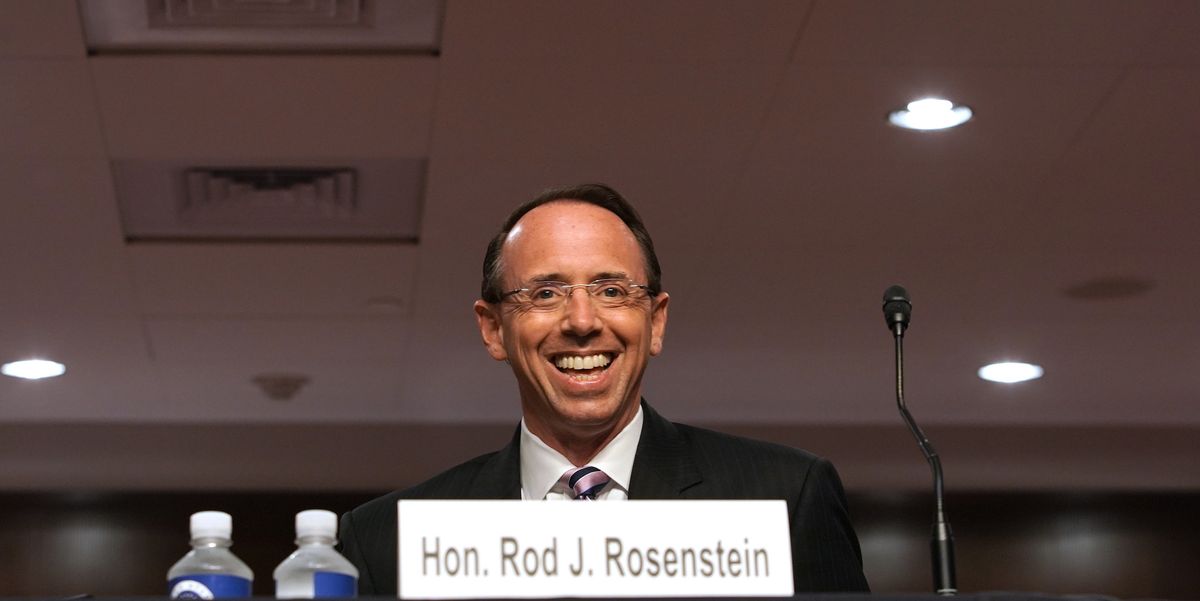
Sooner or later, even though the investigation into the president’s involvement with the Russian ratfcking in the 2016 election had been swept out of the news cycle by all manner of fresh hell, when last we left the saga, there was an unmistakable feeling that there had been a careeRosensteinist in the woodpile. On Sunday, The New York Times handed us a big old clue.
But law enforcement officials never fully investigated Mr. Trump’s own relationship with Russia, even though some career F.B.I. counterintelligence investigators thought his ties posed such a national security threat that they took the extraordinary step of opening an inquiry into them. Within days, the former deputy attorney general Rod J. Rosenstein curtailed the investigation without telling the bureau, all but ensuring it would go nowhere...
Mr. Rosenstein concluded the F.B.I. lacked sufficient reason to conduct an investigation into the president’s links to a foreign adversary. Mr. Rosenstein determined that the investigators were acting too hastily in response to the firing days earlier of James B. Comey as F.B.I. director, and he suspected that the acting bureau director who approved the opening of the inquiry, Andrew G. McCabe, had conflicts of interest.
Mueller was prevented from fully doing the job. Alex Wong Getty Images
“We opened this case in May 2017 because we had information that indicated a national security threat might exist, specifically a counterintelligence threat involving the president and Russia,” Mr. McCabe said. “I expected that issue and issues related to it would be fully examined by the special counsel team. If a decision was made not to investigate those issues, I am surprised and disappointed. I was not aware of that.”
Of all of the participants in this ongoing drama, Rosenstein has had the distinction of being one of the slipperiest. He kept zipping in and out of every crack and crevice in the testimony of various witnesses and was rather a Zelig-like character in most of the major set-pieces. This was summed up admirably in an epic Washington Post piece in April of 2019.
Rosenstein — who, by one account, had gotten teary-eyed just before the call in a meeting with Trump’s chief of staff — sought to defuse the volatile situation and assure the president he was on his team, according to people familiar with matter. He criticized the Times report, published in late September, and blamed it on former deputy FBI director Andrew McCabe, whose recollections formed its basis. Then he talked about special counsel Robert S. Mueller III’s investigation of Russia’s interference in the 2016 election and told the president he would make sure Trump was treated fairly, people familiar with the conversation said. “I give the investigation credibility,” Rosenstein said, in the words of one administration official offering their own characterization of the call. “I can land the plane.”
Or, I guess, he could make sure the plane never leaves the ground. Again, from the Times:
Installing Mr. Mueller as special counsel in May 2017, Mr. Rosenstein ordered him to examine “any links and/or coordination between the Russian government” and the Trump campaign. Many Democrats embraced the appointment as a sign that law enforcement would complete a full accounting of Mr. Trump’s ties to Russia. But privately, Mr. Rosenstein instructed Mr. Mueller to conduct only a criminal investigation into whether anyone broke the law in connection with Russia’s 2016 election interference, former law enforcement officials said.
In retrospect, it’s as though the entire government of the United States reacted to the election of El Caudillo del Mar-a-Lago as though it had been knocked silly with a pipe wrench. While it was stumbling around, enterprising thieves cleaned out its pockets and got away clean.
Respond to this post on the Esquire Politics Facebook page here.
Charles P. Pierce Charles P Pierce is the author of four books, most recently Idiot America, and has been a working journalist since 1976.
This content is created and maintained by a third party, and imported onto this page to help users provide their email addresses. You may be able to find more information about this and similar content at piano.io
Comments
Post a Comment